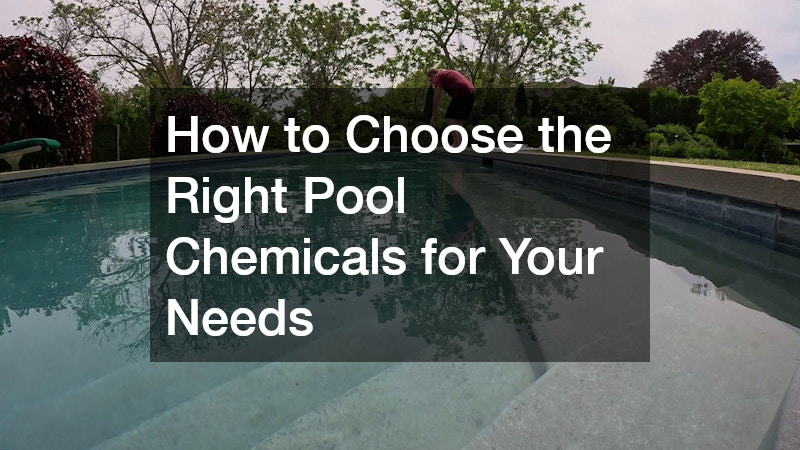Understanding the Basic Pool Chemicals
Before diving into selecting specific pool chemicals, it's essential to understand the basic types available. Chlorine is one of the most common pool chemicals and serves as a primary disinfectant, killing bacteria and algae. It's available in various forms, including tablets, liquid, and granular, each with unique applications and benefits. Another critical chemical is the pool stabilizer, often cyanuric acid, which helps protect chlorine from being broken down by the sun's ultraviolet rays. Keeping these basics in mind, you are better equipped to decide which chemicals align with your needs.
pH balancers play a pivotal role in maintaining water quality and comfort. The pH level should be balanced to provide an optimal swimming environment, which is typically between 7.2 and 7.8. Using muriatic acid or sodium bisulfate can lower the pH, while soda ash or baking soda can raise it, ensuring the pool chemicals work efficiently. Alkalinity increasers and decreasers also assist in keeping pH levels stable by buffering changes. By managing these levels, pool owners can prevent potential issues such as skin irritation and equipment corrosion.
Algaecides are another vital component of pool maintenance. These chemicals prevent algae growth, keeping the water clear and safe. Available as either metallic compounds or quaternary ammonium compounds, algaecides act as a preventative measure rather than a quick fix. They should be used regularly, especially in warmer climates where algae can thrive. Selecting the right type of algaecide depends on existing pool conditions and personal preferences.
Evaluating Your Pool's Specific Needs
Every pool is unique, and evaluating your specific needs is crucial for choosing the right pool chemicals. Consider the pool's size, type, and usage frequency, as these factors influence the chemical balance required. For instance, a heavily used public pool demands more diligent chemical maintenance than a private backyard pool. Regular testing of the pool's water is recommended to determine chemical levels and necessary adjustments. These assessments should encompass pH, chlorine, alkalinity, and other relevant metrics.
In addition to testing, understanding the existing water conditions is fundamental. The source water, whether it's municipal, well, or rainwater, introduces its array of minerals and contaminants. TDS (Total Dissolved Solids) can affect water clarity and sanitizer efficacy, necessitating specific treatments. You may also need to consider the impact of environmental factors like leaves, dirt, and rain runoff, which can alter the pool's chemistry. Adjustments in the type and amount of chemicals may be necessary to accommodate these external variables.
Personal preferences and sensitivities can also dictate pool chemical choices. Some may prefer chlorine alternatives, such as saltwater systems, which offer a gentler swimming experience. Others may prioritize minimizing chemical use for environmental reasons or wish to avoid certain additives due to allergies. Understanding these preferences helps tailor a maintenance routine that aligns with the pool owner's values and health considerations. Such personalized attention ensures optimal enjoyment and safety for all swimmers.
Choosing High-Quality Pool Chemicals
Once you've assessed your pool's needs, selecting high-quality pool chemicals becomes the next focus. Look for reputable brands known for consistency and reliability in their product offerings. Quality chemicals often require less frequent application and yield better results, providing a more effective solution for pool maintenance. Additionally, these products are typically backed by research and development, ensuring they're formulated to meet safety and performance standards. Reading reviews and seeking recommendations from pool professionals can offer insights into which brands and products are most effective.
The composition of pool chemicals is another factor to consider during selection. For example, stabilized chlorine products are beneficial for outdoor pools to prevent chlorine degradation by sunlight. Similarly, eco-friendly options typically contain fewer harsh chemicals and are biodegradable, aligning with sustainable practices. By understanding the composition, pool owners can ensure that their chosen chemicals meet specific needs, both functional and ethical. Aligning product choices with pool conditions and user preferences guarantees a well-maintained, balanced pool environment.
Purchasing from specialized pool supply stores can also be advantageous. These retailers often employ knowledgeable staff who can provide detailed guidance and answer questions about pool chemicals tailored to your requirements. Moreover, they might offer comprehensive testing services and recommend personalized solutions based on the results. Establishing a relationship with a trusted supplier can streamline the maintenance process, ensuring continuous access to the right products. Investing in quality pool chemicals supports long-term pool health and enjoyment, safeguarding both the water environment and the swimmers.

